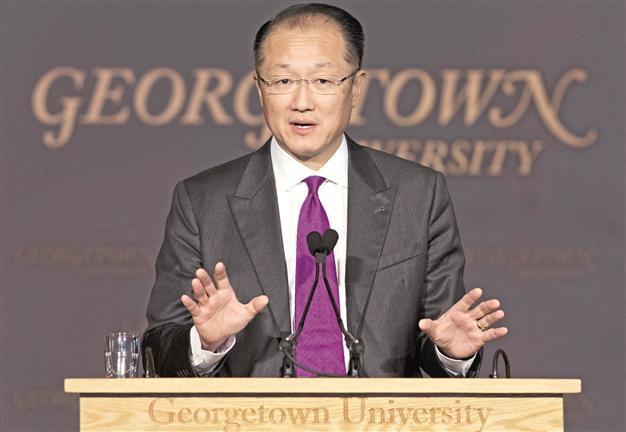World Bank Head calls for ending extreme poverty by 2030
WASHINGTON

World Bank President Jim Yong Kim speaks about ending extreme poverty during a speech at Georgetown University in Washington. AFP photo
World Bank Group President Jim Yong Kim has called for global actions toward ending extreme poverty by 2030. He has urged the global community to improv the lives of most vulnerable people in the developing countries and promote shared prosperity to boost the incomes of the poorest 40 percent of the population in each country.“We are at an auspicious moment in history when the successes of past decades and an increasingly favorable economic outlook combine to give developing countries a chance - for the first time ever - to end extreme poverty within a generation,” Kim said in a speech at Georgetown University on March 2, as World Bank’s press release reported after the event. “Our duty now must be to ensure that these favorable circumstances are matched with deliberate decisions to realize this historic opportunity.”
Kim stressed that developing economies rebounded quickly from the crisis and are now in a fundamentally sound position, thanks to greater macroeconomic stability, a stronger rule of law, and increased investments in human capital and infrastructure. Productivity growth in the private sector, the source of 90 percent of all jobs, is high.
Kim noted that the first Millennium Development Goal (MDG), to halve extreme poverty, was achieved in 2010, five years ahead of time, after developing countries spent years investing in social safety nets and working hard to build the fiscal space and create the macroeconomic buffers to respond effectively if a crisis hit.
Three factors
To achieve the more difficult goal of virtually eliminating extreme poverty, Kim described three factors necessary: “First, to reach the goal by 2030 will require an acceleration of the growth rate observed over the past 15 years, and in particular sustained high growth in South Asia and Sub-Saharan Africa. Second, it will require efforts to enhance inclusiveness and curb inequality, and ensure that growth translates into poverty reduction, most importantly through job creation. And third, it will require that potential shocks – such as new food, fuel, or financial crises and climatic disasters – be averted or mitigated.”
Kim asserted that to meet global challenges, fighting extreme poverty alone is not enough.“We must collectively work to help all vulnerable people everywhere lift themselves well above the poverty line. At the World Bank Group we call this boosting shared prosperity.”
Kim stated that the Bank Group’s work is not just in poor countries, and he called for the Bank and its partners to work toward the second goal of boosting the incomes of the poorest 40 percent of the population in each country. Kim made clear that ending poverty and boosting shared prosperity are not goals which the World Bank Group itself will achieve.
“They are goals which we hope our partners – our 188 member countries – will achieve, with the support of the World Bank Group and the global development community,” he said.
















